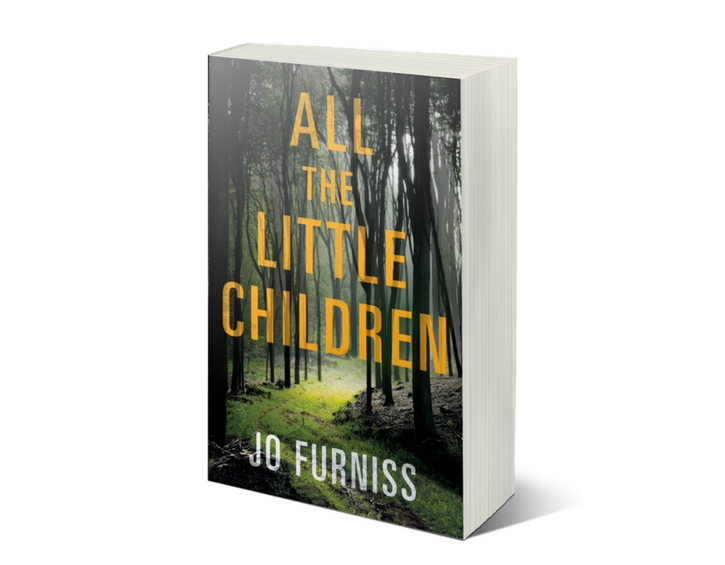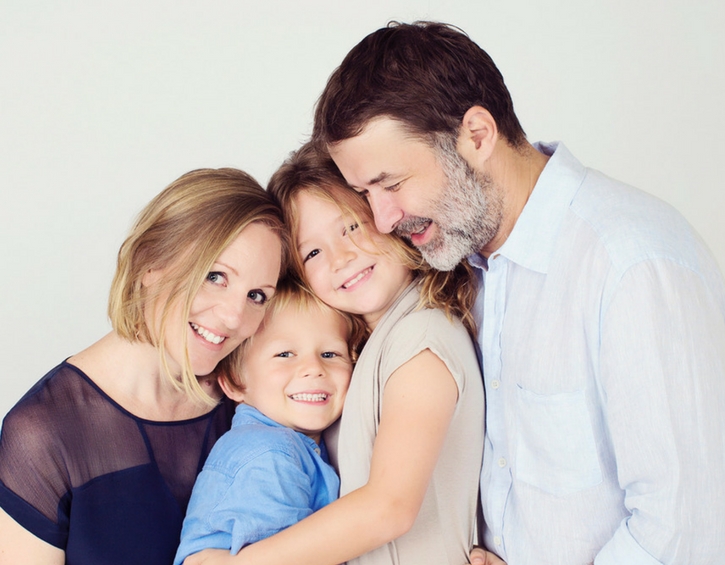
We speak to author Jo Furniss about her recently published book ‘All The Little Children’, an unputdownable (#realword) survival thriller.
British author, Jo Furniss, former BBC journalist and mother of two kids, speaks to us about her first novel “All The Little Children” which she finished writing here in Singapore. Do check out her book club discussion points at the end of the interview too.
How would you describe your novel?
All The Little Children is a survival thriller that puts motherhood in the foreground of a dark setting. If you liked The Road or Room then you might enjoy my novel. The main character is a hard-working mum – a real person with flaws – who makes heart-breaking decisions in order to protect her family.
What inspired you to write this book?
I started writing the story when I lived in a tiny village in Switzerland with two very young children. I used to while away the days walking with them in the forest. It was beautiful but isolated, and I became fascinated by the idea of how I would cope without all the usual support structures that modern mothers rely on. Could I survive alone?

The main character Marlene is quite a provocative character coming across initially as quite a hard business woman who we later understand struggles like the rest of us with mama guilt and defending herself in the mommy wars. How did this character come about?
So there I was, in my isolated village, reading way too many mommy blogs, parenting books and newspaper columnists who confidently detailed all the ways I was parenting badly. So much judgment. So much disapproval. That insidious drip, drip, drip of criticism. And sometimes, other women did it too – drip, drip, drip. I felt press-ganged into the so-called Mommy Wars.
I got so annoyed by this constant stream of negativity, especially around work/life balance – if I chose to work, I would be criticised for not being with my kids, if I chose not to work, I would be criticised for letting down the feminist side, if I chose to work part-time and be at home part-time, I would be criticised for doing both things half-heartedly. Mothers can’t win, even though – and here’s the kicker – most of the time, we don’t even have much choice; we’re just doing what we have to do. All this frustration poured into Marlene and you’re right, she is provocative. But I wanted to show the impact that this constant pressure can have on a woman who is only trying to do her best.

Marlene is the breadwinner of the family – we like this empowering role model for kids – how do you inspire your kids to be empowered and not follow gender stereotypes?
I feel like a bit of a fraud, because our household is built on typical gender lines: my husband is the breadwinner and I created a job for myself that allows me to be there when the kids come home from school. In that respect, Marlene is perhaps a fantasy for me, although I’m not sure I’d have the stamina to live her life!
Of course, kids learn by example. Over the past couple of years, they’ve seen me go through an intense period of rejection and recovery and more rejection as I tried to get this book published. I hope it’s empowering for them to see that good things don’t come easily, that sheer bloody-mindedness can pay off!
The story starts with the scene of Marlene taking her kids on a camping trip to bond, given she hardly gets to see her family due to work. How do you deal with working mom guilt?
Only today I told my son that I wasn’t going to watch a school running race because I have a deadline. He cried; I felt terrible. Happily, my friend who was able to attend this time sent me some snaps, so I can show him when he gets home and hear all about it. It’s not perfect, but I feel less guilty about these moments since my book came out because the kids can see what it is that I’m doing and they’re proud of me. Also, I think it’s important for the kids to realise how privileged we are because this Singapore lifestyle (especially with a helper) allows us more quality time together than we might have elsewhere.
The book is about a mother going into survival mode looking after her kids and as the story develops, so does the main character, almost becoming more maternal and more duty bound to look after others. Are there hints of a political message?
As I was writing the novel, I noticed strange parallels with events in the real world. The first was the Ebola outbreak and the second was the Syrian crisis. Although very different situations in themselves, they both had a terrible impact on families. Parents were separated from children. Some countries opened their arms to refugees, while others did not. In my novel, Marlene faces what I call “the mother of all dilemmas”: she has to decide whether to save her own kids or try to save others as well. She asks where the boundary of her responsibility lies and, without giving spoilers, feels a duty to take all the little children under her wing – hence the title. The parallel with refugees is made explicit at the end. Her personal story of stepping up and taking responsibility for others is a microcosm of the political story.

One of the intriguing questions your book raises is wondering what you, as the reader would do if in the same predicament. Would you help others at the risk to yourself and your family?
Would I save all the little children? To be honest, I can’t even cope with a double sleepover. Seriously, I think my initial instinct would be to protect myself and my family. But then there’s something else that kicks in, a sense of duty that comes with adulthood. How would I live with myself if I turned my back on a bunch of kids who needed protection?
You touch on TCK syndrome in the book. That is relevant for many expats in Singapore – where do your kids call home and how do you give your kids a sense of belonging?
Marlene is herself a TCK and struggles a little with emotional detachment, although she’s also resilient and independent. My kids have never lived in the UK and they call our house home. But a little bit of them belongs to Shropshire, and a little bit belongs to Switzerland, where they were born, and a little bit belongs to their school ‘tribe’. They seem completely untroubled by it – at the moment!
You don’t skirt around death – without giving too much away, there is a fair amount of death, including children and animals. Talk to us about why you felt it important to include both.
If you write a ghost story, then sooner or later there’s got to be a ghost. If you write a romance, there must be a kiss. If you write a crime novel, there’s got to be a body. It’s a pact between author and reader – a promise you make early on and have to keep. My novel is tense, frightening even, so I had to follow through on the danger I promised at the start.
Why did you choose to end the book as you did?
The ending has proved controversial! Any story asks two questions – one related to the plot and one related to the character. My plot question is simply: can she protect her children? My character question is: can she prove (to herself) that she’s a good mother? For me, the story ends with the resolution of those two points.

Your second novel, Trailing Spouse, (out August 2018) is about an expat wife living with her husband and step-daughter on Sentosa. Give us a little teaser about what happens next?
When Amanda Bonham finds her helper dead one night, suspicion falls on the man of the house, Ed Bonham. His teenage daughter questions the circumstances of her birth mother’s suicide, prompting Amanda to doubt her husband – and to investigate what he gets up to on his frequent business travels… Another character returns to Singapore, where she lived as a kid, hoping to resolve a family mystery. With only hazy memories of her parents, she is drawn to Ed Bonham and his possible involvement in their disappearance fifteen years ago. It’s a twisty, turny plot – Gone Girl meets Desperate Housewives!
Hopefully this is not based on anyone you know here in Singapore? Or is it?
All my friends! No, I’m joking. This novel verges on gothic, in the sense that every aspect is twisted and amplified – it is based on Singapore expat life, but a technicolor version. In my two novels so far, I’ve noticed that characters are jigsaws put together from elements of people I know, myself, and pure imagination. But I do think Singapore expats will recognise aspects of our world in Trailing Spouse; there’s a degree of social satire too, so in light of Crazy Rich Asians, this novel could perhaps be called “Crazy Rich Expats”!
You finished writing your first book in Singapore – did you have any support for this process?
I started the book while studying an MA in Professional Writing, and when I moved here I joined the Singapore Writers Group (SWG), which has monthly meetings for authors of various genres. We also run workshops and events. Both communities were crucial to getting this novel to publication standard. I can’t emphasise enough how important it is to share work-in-progress and build a small group of trusted readers to try out drafts and discuss ideas. I do regular power walks with writer friends, where we thrash out plot issues while staving off ‘writers bottom’.
Any tips for writers – either for writing or in regards to marketing and publishing?
Consider doing a short course – it will give you permission to prioritise your writing, which can be hard to do when you’re starting out. Join the SWG or SCWBI (if you’re writing for children) – you don’t have to do it alone! And it might take you a long time, your friends and family may get sick of hearing about this ‘book’ you’re writing; ignore them, do it anyway.
Book Club Discussion Ideas for All The Little Children by Jo Furniss
- All the Little Children is an apocalyptic story centered on two mothers and their children’s struggle for survival. How does this story differ from other apocalyptic narratives you’ve read?
- Marlene hints that she feels judged as a working mother, especially when she travels for business and leaves her children at home. She complains that women today don’t have any more choices, “only higher expectations.” Do you agree with Marlene’s statement?
- Why do you think it was important for Marlene and Joni to hold ceremonies at certain moments? If you were in a similar situation, what rituals might you perform?
- Marlene and her group essentially become refugees in their own country. Do you consider Dr. Larsen a hero or rebel? How do you think Marlene and Lola’s relationship might develop after the end of the novel?
- The English countryside is often depicted as gentle and bucolic with rolling hills, flowery meadows, and an absence of ferocious or poisonous wildlife. Did the landscape in this novel surprise you?
Many thanks for chatting with us Jo, we can’t wait to read your next book! Big thanks too for the lovely photos courtesy of Littleones Photography!






 View All
View All




 View All
View All









 View All
View All



